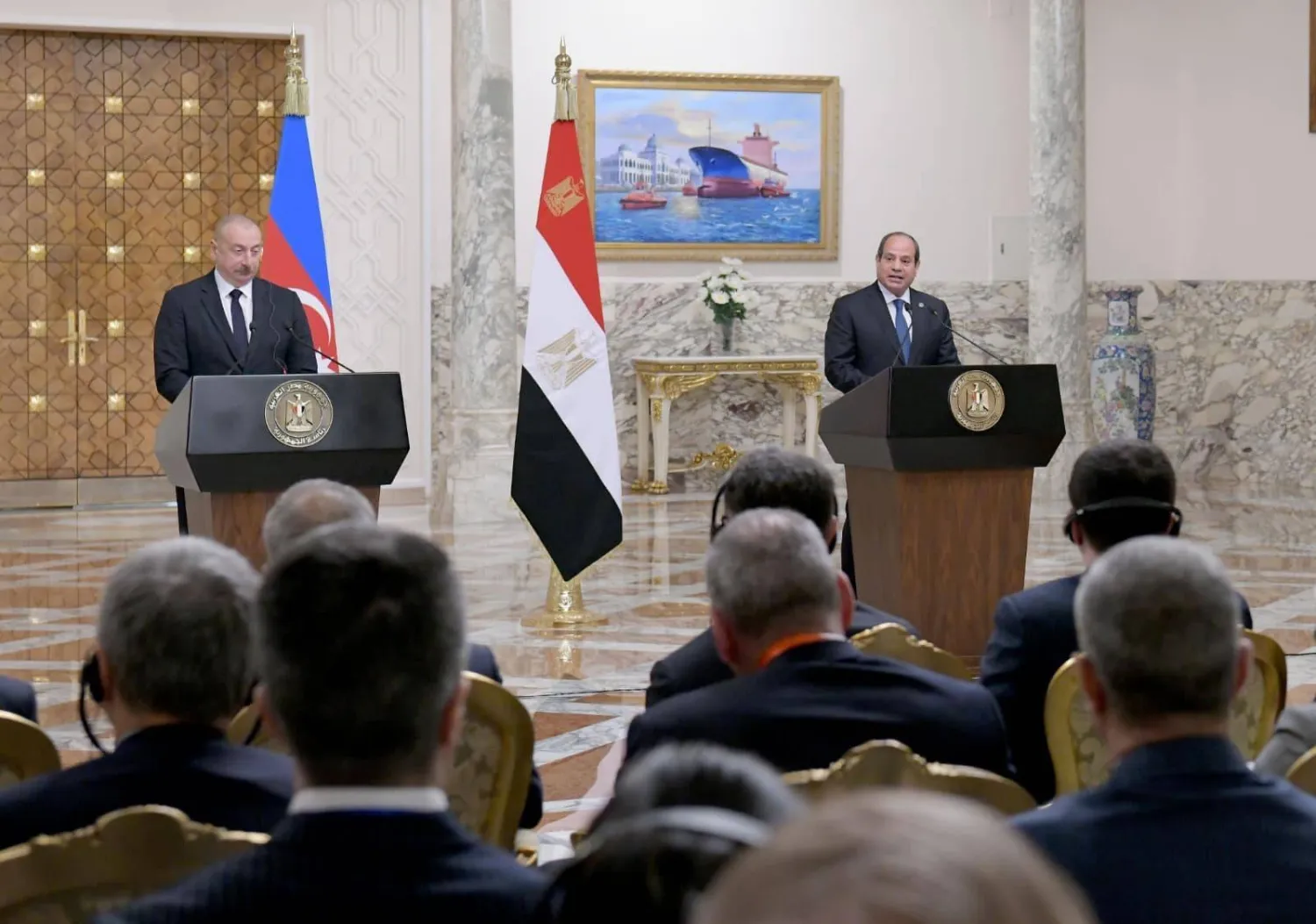Cairo and Baku on Saturday discussed ways to enhance political and economic cooperation.
“The discussions held with President (Ilham) Aliyev confirm our aspirations to continue working together to enhance relations between our countries in various fields, political coordination on regional and international issues of common interest,” Egyptian President Abdel Fattah al-Sisi said.
At a joint press conference with his Azeri counterpart, Sisi said the two sides agreed on promoting their economic and trade relations by utilizing the available potentials of both countries, particularly in the sectors of construction, transportation, telecommunications and Information Technology, food, pharmaceutical industries, as well as oil and gas.
The presidents also agreed on the importance of holding regular rounds of political consultations between the two countries.
“We look forward to holding the meetings of the sixth session of the Egyptian-Azerbaijani Joint Intergovernmental Commission on Economic, Technical and Scientific Cooperation as soon as possible”, Sisi said.
This is in addition to organizing the Egyptian-Azerbaijani Businessmen's Forum, which will contribute to advancing economic and trade relations between the two countries towards further cooperation in the coming period, he added.
For his part, Aliyev said his visit to Cairo will contribute a great deal to the development of Egyptian-Azerbaijani relations.
“The increase in trade volume is, of course, a positive development. If we look at the statistics, we will see that the turnover has increased several times,” the Azeri President said.
The volume of trade exchange between the two countries reached “$35 million during 2023,” according to data from the Central Agency for Public Mobilization and Statistics in Egypt.
In Cairo, Sisi and Aliyev also attended the signing ceremony of a number of memorandums of understanding (MoUs) between the two countries in various domains.
At the Azeri level, Aliyev said he discussed with his Egyptian counterpart the normalization of relations with Armenia.
“It was also brought to my colleague's attention that for almost two years, there had been calm on the Azerbaijan-Armenia conditional border with no ceasefire violations recorded,” Aliyev stressed.
Sisi reiterated Egypt's support for all the initiatives aimed at achieving peace and stability in the South Caucasus region and full support for dialogue and negotiation for the attainment of just and comprehensive peace.
“In this regard, I would like to commend the recent progress concerning the demarcation of borders between Azerbaijan and Armenia, which allows for the commencement of a new phase of development and serves the interests of the peoples of the region,” he said.
At the regional level, the two presidents discussed the situation in the Gaza Strip. Sisi outlined Egypt's efforts to provide access to humanitarian aid and to achieve a ceasefire.
“This is in order to move towards the establishment of a sovereign Palestinian State along the borders of June 4, 1967, with East Jerusalem as its capital, in accordance with relevant resolutions of international legitimacy and to promote peace and coexistence in the region, instead of wars, destruction, and devastation,” he said.
The Azeri President said the settlement of the Palestinian-Israeli relations and the establishment of an independent Palestinian State were always in the center of attention during his country’s chairmanship of the Non-Aligned Movement.
“A number of events were held, and Azerbaijan's position is unequivocal – an independent Palestinian State must be established and East Jerusalem should be its capital. Today's tragedy in Gaza must be stopped as soon as possible, the war must be stopped and all issues must be resolved through negotiations,” he said.
Aliyev then invited his Egyptian counterpart to COP29, which will be held next November in Baku.
Egypt, Azerbaijan Hold Talks to Enhance Political, Economic Cooperation

Egyptian President Abdel Fattah al-Sisi and his Azeri counterpart President Ilham Aliyev hold press conference in Cairo on Saturday (Egyptian Presidency)

Egypt, Azerbaijan Hold Talks to Enhance Political, Economic Cooperation

Egyptian President Abdel Fattah al-Sisi and his Azeri counterpart President Ilham Aliyev hold press conference in Cairo on Saturday (Egyptian Presidency)
لم تشترك بعد
انشئ حساباً خاصاً بك لتحصل على أخبار مخصصة لك ولتتمتع بخاصية حفظ المقالات وتتلقى نشراتنا البريدية المتنوعة







